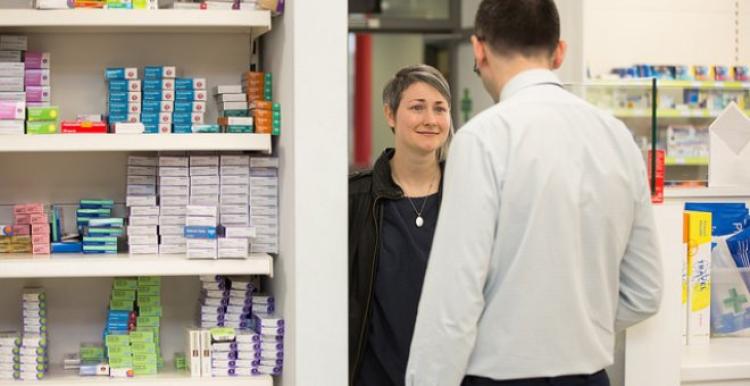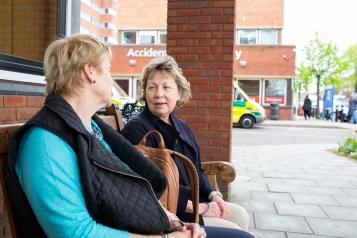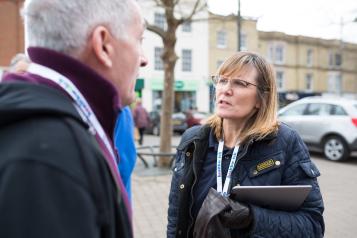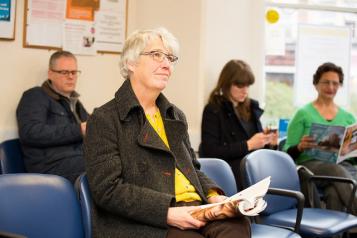Should I see a pharmacist instead of a doctor?

Pharmacists are qualified healthcare professionals who can offer clinical advice and over-the-counter medicines for a range of minor illnesses.
The pharmacist will let you know if you need to go and visit a doctor however they can help you with a number of things first.
Can a pharmacist prescribe medication?
Pharmacists can offer advice and over-the-counter medication to help with a range of common conditions and minor injuries such as:
- common ailments such as coughs, colds and the flu
- tummy trouble,
- aches and pains,
- skin rashes
- cystitis
- access to the morning after pill and pregnancy tests
Your pharmacist can help manage repeat prescriptions and help with any questions that you might have about medication that you have been prescribed by the doctor.
If you’re taking lots of different medicines, you may be able to have a Medicines Use Review with your pharmacist to help you work out when you should be taking your medication and discuss any questions or side effects.
Find your nearest pharmacist
Do I need to see the doctor every time I need a prescription?
Not necessarily, your pharmacist can help manage repeat prescriptions for you. If you take medication on a regular basis and your condition is stable, your GP may be able to offer a long-term repeat prescription.
Do I need to pay for my prescription?
Free NHS Prescriptions
You can get free NHS prescriptions if, at the time the prescription is dispensed, you:
- are 60 or over
- are under 16
- are 16 to 18 and in full-time education
- are pregnant or have had a baby in the previous 12 months and have a valid maternity exemption certificate (MatEx)
- have a specified medical condition and have a valid medical exemption certificate (MedEx)
- have a continuing physical disability that prevents you going out without help from another person and have a valid MedEx
- hold a valid war pension exemption certificate and the prescription is for your accepted disability
- are an NHS inpatient
You’re also entitled to free prescriptions if you or your partner (including civil partner) receive, or you’re under the age of 20 and the dependant of someone receiving:
- Income Support
- income-based Jobseeker’s Allowance
- income-related Employment and Support Allowance
- Pension Credit Guarantee Credit
- Universal Credit and meet the criteria
If you’re entitled to or named on:
- a valid NHS tax credit exemption certificate – if you do not have a certificate, you can show your award notice; you qualify if you get Child Tax Credits, Working Tax Credits with a disability element (or both), and have income for tax credit purposes of £15,276 or less
- a valid NHS certificate for full help with health costs (HC2)
People named on an NHS certificate for partial help with health costs (HC3) may also get help.
Find out more about the NHS Low Income Scheme (LIS)
People with certain medical conditions can get free NHS prescriptions. For a list of these conditions and a range of other information see this page.
Medical Pre-payment Certificate (PPC)
If you need more than 1 prescribed medicines for three months or more each year, you could save money with a 3 month or 12 month PPC.
For more information, visit the NHS Business Services Authority website.
Who do I turn to about general advice for my health and wellbeing?
You can visit your pharmacist instead of your GP about how best to keep you and your family well. They’ve all sorts of advice, from how to eat healthily, lose weight, and what type of exercise you could be doing.
What are the free services offered by pharmacies?
Free services that are offered by all NHS contracted community pharmacies include:
- Dispensing services (medicines & appliances) – supply of medications with advice on their safe and appropriate use, possible side effects and interactions with other substances.
- Electronic prescribing system – you can now nominate your regular pharmacy to have prescriptions sent over electronically from your GP surgery so they can prepare your medications before you come into the pharmacy.
- Repeat dispensing –after you have nominated your regular pharmacy, you can directly request your monthly medications from your pharmacy without having to book an appointment with your GP.
- Support for self-care – give advice on minor ailments and over the counter medications that can be purchased without a prescription.
- Disposal of unwanted or expired medicines
- Promote healthy lifestyles
What other services do pharmacists offer?
Your local pharmacist might also offer some of the following services. To find out what your community pharmacist offers, just ask them.
- New medicine service – this service is eligible for patients with a newly prescribed medicine for one of the following conditions: Asthma/COPD, Type 2 diabetes, High blood pressure, or conditions that involve a medicine to thin the blood. Provide additional advice to address any problems that you may experience during the first month of a new drug treatment, such as potential side effects.
- Medicine Use Review – gives you an opportunity to ask any questions that you may have and the pharmacist can check if you are experiencing any side effects. It also allows the pharmacist to check whether you are taking your medications correctly and signpost you to relevant services that may help you to cope with your condition better.
- Seasonal flu jab – is offered free of charge if you are: 65 years of age or over, pregnant, living in a long stay residential care home, main carer of an elderly or disabled person whose welfare is dependent on you, or between the age of 18 to 65 years of age with a medical condition including long term COPD, asthma, heart disease, severe kidney disease, liver disease, neurological disease, type 1 and type 2 diabetes, condition with a weakened immune system or splenic dysfunction
- Home delivery
- Monitored dosage systems – your pharmacy will prepare a weekly or monthly blister pack for you with separate compartment for different time of the day to help you take your medication on time.
- Text to collect – your pharmacy will send you a text when your prescription is ready for pick up.
- Emergency hormonal contraception – you and your pharmacist will have a private consultation to decide on the appropriateness of supplying the pill to prevent unwanted pregnancies.
- Minor ailments Scheme – only eligible to patients who meet certain criteria for specific conditions.
- Stop Smoking – whether you are still deciding or finding it difficult to quit smoking, you can talk to a local pharmacist to discuss your smoking goals and recommendations on any Nicotine Replacement Therapy (NRT).
- Blood pressure checks – a trained pharmacy staff will take your blood pressure and then explain your results to you along with advice on managing your blood pressure.
- Weight management schemes – a service to help you lose weight and provide diet and nutrition advice.
- Supervised consumption of methadone and provision of needle exchange schemes for drug users
- Screening services (Chlamydia, diabetes, cardiovascular risk, etc)
What training do pharmacists have?
All pharmacists train for five years in the use of medicines. They are also trained in managing minor illnesses and providing health and wellbeing advice.
Is a chat with my pharmacist confidential?
Many pharmacies have a private consultation room where you can discuss issues with pharmacy staff without being overheard. Ask them if you would like to talk in private.
More information
For more information, or for a large print or easy read guide please visit the NHS website.
You can also watch this British Sign Language (BSL) video guide to find out how a pharmacist can help.
Other services that can help you find the right treatment
-
Your local Healthwatch
They can help you find the right treatment and support. Find your nearest Healthwatch here. - NHS 111
They can advise whether a trip to the pharmacy, doctors or A&E is the most appropriate for you. Just call 111. - A&E
If you are in need of urgent medical care call 999 or go to your nearest A&E department. Find your nearest A&E services here.


